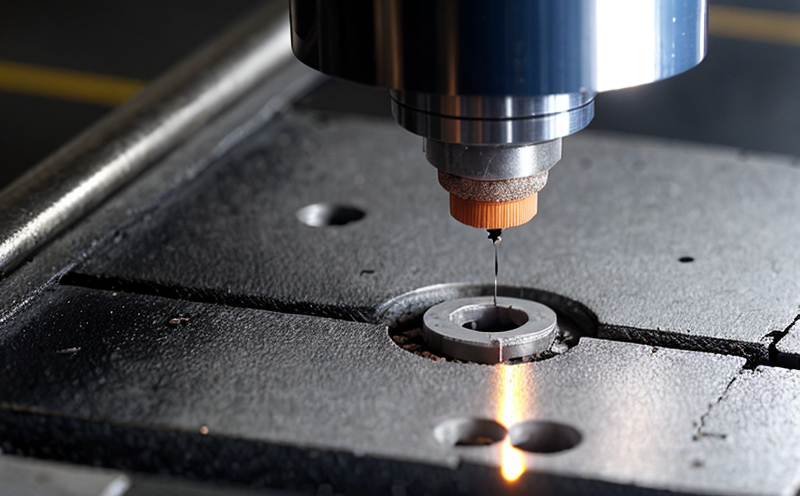ASTM F763 Crack Propagation Failure Testing
The ASTM F763 standard is a critical method used in the semiconductor and microchip testing sector to evaluate crack propagation failure mechanisms. This test is essential for ensuring that microelectronic devices can withstand stress-induced failures, which are common during manufacturing or under operational conditions.
Crack propagation failure testing simulates real-world scenarios where stresses lead to the initiation, growth, and eventual fracture of defects in semiconductor materials. The ASTM F763 method involves subjecting specimens to a combination of mechanical and thermal stimuli that mimic the operating environment. This process allows for the identification of potential weaknesses within the material or design.
The primary focus of this testing is on understanding how cracks form, grow, and ultimately lead to failure. By using ASTM F763, manufacturers can ensure their products meet stringent quality standards and are capable of withstanding expected operational stresses without failing prematurely. This method is particularly useful for failure analysis in complex semiconductor structures where identifying the root cause of a defect or fracture is crucial.
During this process, samples undergo cyclic loading to induce crack formation and propagation. The test conditions replicate typical operating environments, including temperature variations and mechanical loads. Specimens are carefully prepared according to ASTM F763 specifications, ensuring that any observed cracks can be accurately attributed to the testing environment rather than preparation artifacts.
The results of ASTM F763 testing provide valuable insights into the reliability and durability of semiconductor devices. This information is invaluable for quality managers, compliance officers, R&D engineers, and procurement teams who need to ensure that their products meet rigorous standards. Understanding these failure mechanisms allows manufacturers to implement improvements that enhance product performance and extend operational life.
Crack propagation failure testing under ASTM F763 also aids in the development of new materials and designs by identifying critical parameters affecting crack initiation and growth. By incorporating this knowledge into design iterations, engineers can create more robust semiconductor components capable of withstanding harsher conditions without compromising performance.
In summary, ASTM F763 crack propagation failure testing is a cornerstone of quality assurance in the semiconductor industry. It provides a comprehensive assessment of how cracks form and propagate within microelectronic devices, offering critical data for improving product reliability and durability.
Benefits
The benefits of ASTM F763 crack propagation failure testing extend across various aspects of semiconductor manufacturing and quality assurance. By incorporating this method into their processes, manufacturers can achieve several key advantages:
- Enhanced Reliability: Identifying and addressing potential weak points in the design early on ensures that final products are more reliable.
- Improved Durability: Understanding how cracks form and propagate helps engineers develop components that last longer under operational conditions.
- Risk Mitigation: This testing method allows manufacturers to identify risks associated with specific materials or manufacturing processes before they become critical issues.
- Informed Decision-Making: The insights gained from ASTM F763 testing provide valuable data for making informed decisions about design improvements and material selection.
These benefits not only enhance the overall quality of semiconductor products but also contribute to cost savings by reducing rework, scrap rates, and potential recalls. Additionally, compliance with industry standards like ASTM F763 enhances a company’s reputation in terms of product reliability and customer trust.
Eurolab Advantages
Eurolab stands out as a leader in semiconductor & microchip testing services by offering unparalleled expertise, advanced instrumentation, and comprehensive support for ASTM F763 crack propagation failure testing. Our team of highly skilled professionals ensures that every aspect of the test is conducted meticulously, adhering strictly to ASTM standards.
Our state-of-the-art facilities are equipped with cutting-edge equipment capable of replicating real-world stress conditions accurately. This allows us to provide precise and reliable results, which are essential for making accurate assessments of crack propagation failure mechanisms. By leveraging our advanced technology, we can help clients achieve higher levels of product reliability and durability.
At Eurolab, we pride ourselves on providing exceptional customer service throughout the entire testing process. From initial consultation to final report delivery, our team works closely with each client to ensure that their specific needs are met. Our commitment to quality extends beyond just meeting regulatory requirements; it includes going above and beyond to provide customized solutions tailored specifically for each project.
In addition to our technical capabilities, Eurolab also offers extensive experience in the semiconductor industry. This deep understanding of the sector allows us to offer valuable insights that go beyond mere compliance with standards like ASTM F763. By combining this knowledge with our testing expertise, we can help clients optimize their manufacturing processes and improve product performance.
With Eurolab as your partner in ASTM F763 crack propagation failure testing, you can rest assured knowing that you are receiving the highest quality service available today.





